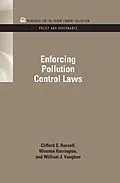Economic models are used to show the extent of the difficulties involved in monitoring and enforcing pollution control laws on a continual basis. The authors make several recommendations for policy change. They also show that high rates of compliance can be achieved within tight budget constraints. Originally published in 1986
Autorentext
Russell, Clifford S. ; Harrington, Winston; Vaughn, William J.
Zusammenfassung
Whether taking classes in school, college or university, or in a corporate training setting, it is likely that learners will be expected to do at least part of their studies via the computer. This book provides realistic guidelines to ensure their success in the virtual learning environment. From detailing tools such as WebCT and Blackboard, to overcoming personal barriers to success in distance learning, this handy text deals with issues that readers of any age, stage or situation are likely to encounter by:* demystifying terms and concepts common to online learning* addressing issues of online ethics such as netiquette, plagiarism and software piracy* offering practical advice on interacting effectively online, submitting assignments and doing research* furnishing numerous links to Web pages and other resources for further study and research.The author offers serious and humorous anecdotes to help readers avoid the pitfalls and capitalize on opportunities that will help them become a successful online student. Current and prospective online learners will greatly benefit from this practical book filled with clear, detailed assistance for learning online.
Inhalt
Chapter 1 Introduction to the Problem; Chapter 2 Current Efforts to Induce Continuous Compliance; Chapter 3 Excursions into Law and Technology; Chapter 4 Economic Models of Monitoring and Enforcement; Chapter 5 Statistical Background; Chapter 6 A Statistical Quality Control Model; Chapter 7 Lessons from Game Theory Approaches; Chapter 8 Conclusions and Recommendations;
